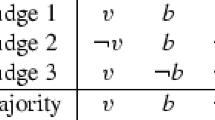Abstract
Judgment aggregation is naturally applied to the modeling of collective attitudes. In the individual case, we represent agents as having not just beliefs, but also as supporting them with reasons. Can the Judgment Aggregation help model a concept of collective reason? I argue that the resources of the standard judgment aggregation framework are insufficiently general. I develop a generalization of the framework that improves along this dimension. In the new framework, new aggregation rules become available, as well as a natural account of collective reasons.
Similar content being viewed by others
References
Cariani, F. (2011). Aggregation rules and epistemic norms. Manuscript. Evanston, IL: Northwestern University.
Cariani F., Pauly M., Snyder J. (2008) Decision framing in judgment aggregation. Synthese 163: 1–24
Chandler, J. (2012). Acceptance and aggregation, and scoring rules. Erkenntnis. doi:10.1007/s10670-012-9375-6.
Chapman B. (2002) Rational aggregation. Politics, Philosophy and Economics 1(3): 337–354
Dietrich F. (2007) A generalized model of judgment aggregation. Social Choice and Welfare 28: 529–565
Dietrich F. (2008) Judgment aggregation and the relevance of some issues to others. London School of Economics, London
Dietrich F., List C. (2007a) Judgment aggregation by quota rules: Majority voting generalized. Journal of Theoretical Politics 19(4): 391–424
Dietrich F., List C. (2007b) Strategy-proof judgment aggregation. Economics and Philosophy 23(3): 269–300
Dietrich F., List C. (2008) Judgment aggregation without full rationality. Social Choice and Welfare 31: 15–39
Douven I., Romeijn J.-W. (2007) The discursive dilemma as a lottery paradox. Economics and Philosophy 23: 301–319
Gärdenfors P. (2006) A representation theorem for voting with logical consequences. Economics and Philosophy 22(2): 181–190
Horty J. (2002) Skepticism and floating conclusions. Artificial Intelligence 135: 55–72
Horty J. F. (2007) Reasons as defaults. Philosophers 7(3): 1–28
John J. F. (2007) Defaults with priorities. Journal of Philosophical Logic 36: 367–413
Konieczny S., Lang J., Marquis P. (2004) DA2 Merging operators. Artificial Intelligence 157(1–2): 49–79
List, C. (2007). When to defer to super-majority testimony— and when not to. Manuscript. London: London School of Economics.
List C. (2008) Group deliberation and the revision of judgments: An impossibility result. Journal of Political Philosophy 19: 1–27
List C., Pettit P. (2002) Sets of judgments: An impossibility result. Economics and Philosophy 18: 89–110
List C., Puppe C. (2008) Judgment aggregation: A survey. In: Anand P., Puppe C., Pattaniak P. (eds) Oxford handbook of rational and social choice. Oxford University Press, Oxford
Miller K. M. (2008) Judgment aggregation and subjective decision-making. Economics and Philosophy 24: 205–231
Michael K. M., Osherson D. (2009) Methods for distance-based judgment aggregation. Social Choice and Welfare 32: 575–601
Mongin P. (2005) Factoring out the impossibility of judgment aggregation. Journal of Economic Theory 141(1): 100–113
Nehring, K. (2005) The (im)possibility of a paretian rational. Manuscript. Davis: UC Davis.
Nehring K., Puppe C. (2010) Justifiable group choice. Journal of Economic Theory 145: 583–602
Pauly M. (2006) Logical constraints on judgment aggregation. Journal of Philosophical Logic 65: 132–138
Pettit P. (2001) Deliberative democracy and the discursive dilemma. Philosophical Issues 11: 268–299
Pettit P. (2006) When to defer to majority testimony and when not to. Analysis 65: 132–138
Pigozzi G. (2008) Belief merging and the discursive dilemma. Synthese 152(2): 285–298
Sunstein C. (1995) Incompletely theorized agreements. Harvard Law Review 108(7): 1733–1772
Author information
Authors and Affiliations
Corresponding author
Rights and permissions
About this article
Cite this article
Cariani, F. Aggregating with reason(s). Synthese 190, 3123–3147 (2013). https://doi.org/10.1007/s11229-012-0133-8
Received:
Accepted:
Published:
Issue Date:
DOI: https://doi.org/10.1007/s11229-012-0133-8




